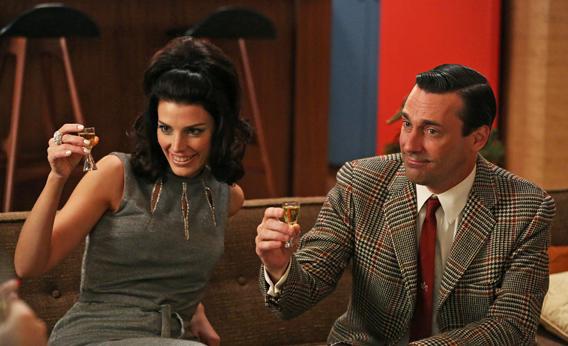Note: There are some minor spoilers for the season premiere in this review.
The sixth season of Mad Men (AMC, Sundays at 10 p.m., premiering this Sunday at 9 p.m.) opens with Don Draper on the road and off the straight path. This is to say that we’ve got him just where we want him: The series always proves energetic when depicting Don’s trippy business trips. In the second season, he flew to L.A. and merged into anomie. In the third, perhaps in search of a father figure, he set himself the quest of designing an ad good enough for Conrad Hilton. And do you recall last season’s domestic dispute at Howard Johnson’s? Megan went through the orange roof.
And now: Don ho. We pick up with our existential hero—a nowhere man every place he wanders—in the 50th state, at the edge of American expansion, in the neighborhood of Pearl Harbor. He is there as the guest of a client, working on a campaign for a hotel and also on his tan and on what passes for his eternal soul. On the fine Hawaiian sand, he reads about the dark Italian forest. No, it’s not exactly subtle to launch this go-round with Jon Hamm reading the opening lines of Dante’s Inferno, but subtlety is not exactly what we want from the show. In any case, the moment invites us to start wondering how much life Don has in him. Dante is 35 years old in the Divine Comedy, and when he is going on about being “midway in the journey of our life,” he is measuring against the good old threescore and 10. Don is past 40, and the whiskey is not aging him well.
You think: Surely Don is past the midway point (especially because you’ve primed to think so by a heart-stopping prelude to the beach scene). You wonder: Mustn’t this series end with his demise? Could it have an afterlife without him? And if the Inferno moment is too much for you—if you are of the opinion that Mad Men thereby reaches a middle-brow crisis point—you start thinking about another televisual trip to the Pacific Ocean and preparing the obvious Fonz joke.
In any event, a stench of death—a force as invisible as the shade of late Lane Pryce, a smell of flesh more spoiled that the plot points at which I am about to glance—floats in on a tropical breeze, and it lingers for two hours while we are exposed to many a pseudo event. In Hawaii, amid kitsch imitations of traditional Oceania, Megan, a rising soap-opera starlet, signs an autograph for fans with a mildly unstable sense of the difference between an actor and a character. In New York, when Don returns to the office, the whole gang at the agency reconvenes on the day of a photo shoot, creating a kind of advertisement for itself. Peggy—now trying to make proud Don’s rival Ted Chaough—has to hustle to re-edit a Super Bowl ad for a headphone set, thus wrenching further from context its quote of Antony’s funeral speech for Caesar. (Friends, Romans, countrymen: lend the headphones your ears. Also, everybody at Sterling Cooper Draper, watch your backs: A new guy in the office is brownnosing in a conspicuous hurry. I hath told you he’s ambitious.) Don performs some symbolically freighted business with an expensive Leica, and he does some righteous crabbing about print-ad symbolism that cheapens love. You see these people sliding unawares into illusions they themselves created.
Meanwhile, there is reality going on, in the 1960s sense, and the episode casually anatomizes the burgeoning youth revolt and snowballing anti-war sentiment with a relatively light touch. Don’s ex-wife, putting her mommy on, spends the episode hoping to rescue a young friend from the squalor of a squat on St. Mark’s Place; down among the dropouts, bourgeois Betty is the target of a snidely insightful jab delivered by a kid who will soon be a hippie or a junkie or both: “We don’t like your life any more than you do.” Betty’s plot is fine—and yet somehow still the most memorable part of it is the sociological detail of a toppled Ritz Crackers box on the lady’s coffee table.
I have buried what is perhaps the lead, which is that Roger Sterling has to bury his mother, dead at 91 of terminal coldness. Roger has a very good episode. He has mellowed into swaggering down, or at least near, the enlightened path, holding forth to his shrink in great blowhard gusts, doing stand-up on the couch in one great scene and confronting the facts in another: “My mother loved me in some completely pointless way, and it’s gone.”
But gone where? What do you suppose Don Draper thinks about whatever follows The End? Considering his spiritual experience in Hawaii—a little awakening in the dark wood, a slow inner revelation that turns on a barstool encounter with a young solider who says, “What goes around, comes around”—I think Don would be inclined to get Zen in his approach to life and the afterlife; aloha means goodbye and also hello and everything else. As the episode moseys to its confident close, he delivers a wild pitch to the clients who sent him to the Aloha State, proposing to create an ad on the theme of liberation and rebirth. But the clients very reasonably find it off-putting—easy to misinterpret as a PSA for shuffling off this mortal coil. To riff on a distinction drawn by Daniel Boorstin: He wants to celebrate the escape-from-self of traveling, and they need to sell escapism to tourists. He’d like to be a Buddhistic, but Nothing is holding him back.
